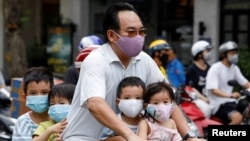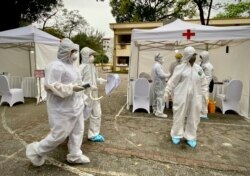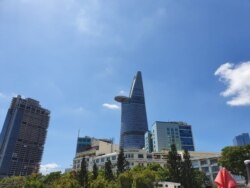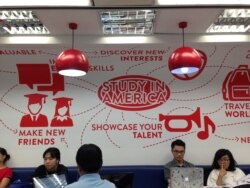Vietnam may look to the United States for everything from technology to study abroad programs. But when it comes to a pandemic that has killed nearly 147,000 Americans and zero Vietnamese, according to Johns Hopkins University, the richer nation would do well to follow Vietnam’s lead, according to a top U.S. envoy in the Southeast Asian nation.
After years of investing in public health, Vietnam headed off COVID-19 early in the year by testing, treating, and isolating patients quickly. The U.S. consul general in Ho Chi Minh City, Marie Damour, held up this response as a model, speaking at an event to mark the silver anniversary of establishing diplomatic ties between the two former war enemies.
“Vietnam has very decisively become probably the country that has been most successful in addressing COVID-19 and suppressing and contact tracing and making sure that the entirety of the society has been involved in this struggle,” Damour said on Thursday. “And that is an example that I would love to see the United States emulate in this particular subject.”
The comments came before Vietnam suffered a setback, this weekend, when it reported a new local COVID infection and broke a 100-day streak without infections. Still Vietnam has had just 424 cases this year and Damour was frank that, in contrast to Vietnam, her own nation should do more about the pandemic. U.S. government officials have run the gamut in their attitude toward the pandemic, from the president who said last week that the coronavirus will disappear, to state governors who have treated it as an existential crisis.
Vietnam benefits US
Damour’s comments were meant as well to highlight what the United States gets out of its relationship with Vietnam. Despite having more limited resources and less global visibility than the United States, Vietnam brings different contributions to the table. Lessons on Covid are an example of that.
A look at the two nations’ response to handling the pandemic is a study in contrasts. Vietnam and the United States both reported their first cases of the coronavirus in the same week in January.
Having experience with SARS and other tropical diseases, Vietnam moved immediately to quarantine patients, trace contacts and limited movement in the population. It is now the most populous nation, of nearly 100 million people, to have reported zero deaths from COVID and fewer than 500 cases.
By contrast the United States went back and forth on whether to wear masks and shut down cities amid a shortage in tests and hospital capacity. The President Donald Trump said on Tuesday, half a year into the pandemic, that it probably will “get worse before it gets better.”
The United States has turned to nations such as Vietnam for donations and purchases of personal protective equipment.
Aboutface in diplomacy
The year 2020 was supposed to be a banner year for Vietnam and the United States. There are not many diplomatic turnabouts as stark as that of the two nations, which fought a war that ended in 1975 and forced the closure of the U.S. Embassy in then-Saigon.
The site reopened in dramatic fashion as a U.S. consulate in the ’90s when the two sides re-established ties. Now, a quarter century later, they are celebrating a silver anniversary of relations, in muted form amid the COVID crisis. Bilateral trade has skyrocketed, along with the exchange of tourists and students, and signs of wartime resentment are scant. The turnabout gives the U.S. a friend in Asia at a time when regional strains with China are becoming increasing.
In Ho Chi Minh City, blown up snapshots of Vietnamese and American officials paper the outer walls of the U.S. Consulate at street level. A few stories above, on Thursday, the consulate commemorated the anniversary with speakers from both sides.
“I think that the relationship between the U.S. and Vietnam is on a track that, it's very hard to change course of the track,” said Dr. Nguyen Thanh Trung, director of the Center for International Studies at the University of Social Sciences and Humanities, Vietnam National University. “And I think it's not dependent on the decision of any individual. I think it’s just, we have built so many things.”








